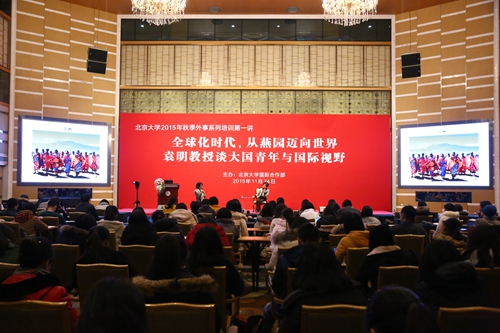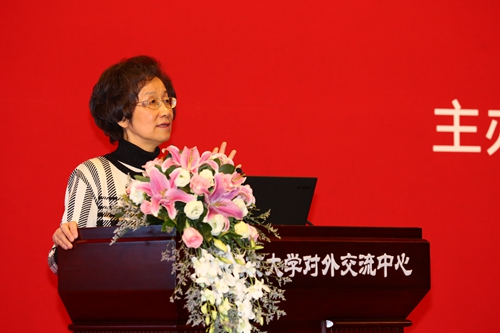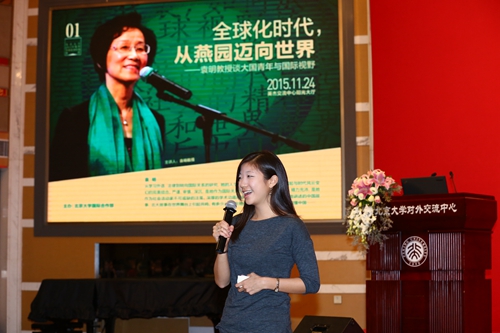Peking University, December 18, 2015: On November 24, PKU Office of International Relations kicked off the Training Sessions of Foreign Affairs of 2015 Fall Semester at the Sunshine Hall in Yingjie Overseas Exchange Center. Yuan Ming, professor from PKU School of International Studies, director of PKU American Studies Center and executive director of the United Nations Foundation, delivered a speech for the first session entitled “Step from Peking University towards the World in the Global Age,” which evoked contemplation on the essence of Chinese youth and international perspective.

The Global Age: The Youth Communicate in Depth with the World
Professor Yuan Ming started off by pointing out that various kinds of culture are under unprecedented intercommunication. Many data on studying abroad shed light on this trend, behind which are stories of struggle and development. According to UNESCO, China surpassed India, Korea, and Germany in the amount of sending students abroad last year, reflecting China’s capacity of talent cultivation, the strength of national development, and the craving for international exchange. Statistics from Center for China and Globalization shows that in 2001, America, Britain and Germany were the top three counties which accepted the largest number of foreign students; while in 2014, China hit the third place of this ranking. This significant change, said Professor Yuan Ming, indicates a tremendous advance of China, and it has laid the foundation of massive international exchange.
The Blending of Multi-culture: “Who am I?” and “Who we are?”
Professor Yuan Ming shared some of her international communication experience with the students. She once saw Snowden hide in a small room at the Moscow Airport when she left Russia after her visit; Oslo laid in ruins after a heavy bombardment, of which Professor Yuan had just taken a picture three weeks before; In Jerusalem, she talked with Jewish youths and sensed their inner tranquility when communicating with God; She also visited the refugees of Pakistan in Jordan with the former UN Secretary General Kofi Annan, listening to their wish of family reunion. From series of experience, Professor Yuan started to think about “Who we are?” in the waves of globalization and informatization.
Self-knowledge is an eternal query of humanity. Different from ancient Greek maxim “Know Yourself,” Chinese traditional interpretation of self-knowledge highlights self-positioning in the broad spectrum of society. Professor Yuan Ming said that in the global age, many conflicts stem from the way we look at other people and conduct ourselves. We need to see more and think more in order to fuse into and understand the society.

Professor Yuan Ming
Meanwhile, cultural integration is also a long-lasting subject. Europe once gave birth to splendid culture and civilization, and they have also gained their new name “the European Union.” At the same time, Anglo-Saxon countries are trying to embrace multi-culture and cultural integration, but they still have a long way to go. Professor Yuan Ming presented some symbolic pictures to the audience in order to show the rich variety among cultures throughout the world.
Today, Chinese culture impacts the world greatly. With the development of cultural exchange and informatinization, Professor Yuan Ming remarked that it is a good idea to promote cultural communication with the help of the Internet, and the network era should be more humanized rather than mechanical and cold.
Youth in PKU: Practice the Spirits of a Great Nation
“What we can do” and “what we should do” are the questions that every PKU student should reflect on. PKU is the paradise of campus life: from the show of the modern adaptation of “Peony Pavilion” to the colorful club activities, from the young volunteers in Beijing Forum to the fascinating performances in the PKU International Culture Festival, we can intensely feel that PKU has become an open stage for students from all over the world. Professor Yuan Ming said, “years ago, when there were no more than 100 exchange students on campus, how could we imagine an International Culture Festival? But now more than 3000 exchange students from 133 countries study here and the dream comes true. With the motto of “We Are One World,” the youth from China and overseas contribute their own knowledge and passion to the construction of PKU, the world in miniature.
Professor Yuan Ming recalled the stories of outstanding PKU students. Wang Dingnan, who had the opportunity to study overseas, chose to devote himself to Egypt and the Middle East; Mi Lu, an exchange student from Tajikistan, mastered Tajik, Farsi, Russian and Chinese languages, went to Sichuan particularly to learn Change Faces, a Chinese classic art; Shu Jun, an exchange student from Nepal, established a hospital in Nepal after his study of medical imagining in PKU, and dedicated himself to disaster relief after the earthquake in Nepal... PKU students are active throughout the world and disseminate the spirit of PKU youth widely.
Professor Yuan Ming said, when she was teaching in Xi’an, she and her students have taken part in the digging process of Qin terra-cotta warriors. At that time, she had no idea about America and the world. What they did were going to work site, digging hard and coming back, without realizing that a historical site of terra-cotta warriors would be unveiled in the future. Perhaps it is just like what we are doing now, the ordinary digging work paves way for all the surprise, and embraces all great meanings of life.
After the speech, Professor Yuan Ming invited Alice Su, a Princeton University graduate and postgraduate studying in Yenching Academy, to share her experience as a free journalist in Jordan. Alice Su said that she once identified herself as the future leader after her graduation. However, when she was helplessly facing countless refugees in Jordan, she began to realize the importance of listening and modesty. Later, she made friend with the refugees and from them she learned what she could never get at in Princeton. The audience were deeply moved by her narration.

Alice Su shared her experience with audience
Then Professor Liu Haifang from African Institute of International Relations of Peking University shared her stories and contemplations about Africa. She said that no matter how dangerous it might be, nothing could stop our steps toward Africa.
Finally, in the question session, two students asked about language learning and responses to emergencies. Professor Yuan Ming advised that we could learn two or three languages as tools. As for the expedients for emergencies, she said that it requires the accumulated knowledge and experience from everyday life.
The first session of the program ended in applause. Professor Yuan Ming’s vivid interpretation of international communication impressed all the audience present.

